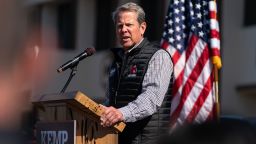Pennsylvania Democratic Senate hopeful John Fetterman anticipated that his debate against Republican Mehmet Oz “wasn’t going to be easy” following a stroke earlier this year but “thought it was important that I show up,” he told CNN’s Don Lemon in an interview that aired Tuesday on “CNN This Morning.”
Fetterman’s first and only debate against Oz intensified the focus on the Democrat’s recovery from the near-fatal stroke he suffered in May. Fetterman’s delivery during the contest was at times halting and repetitive, with the candidate dropping words during answers and occasionally losing his train of thought. The interview with CNN, like during the debate, was conducted with closed captioning technology.
“I just always understood that it wasn’t going to be easy. I am five months into recovery from that, but I thought it was important that I show up and I did it. And at the end of the day, we did, I think, make some important points,” Fetterman said, noting that the debate also gave the Democratic campaign the opportunity to highlight Oz saying “local political leaders” should be involved with women and their doctors when making decisions about abortion.
Fetterman added that he and his doctors believe he is going to “continue to get and feel better and better.”
Fetterman’s race against Oz represents Democrat’s best chance to flip a Senate seat in 2022. Polls have shown the Democrat with a narrow lead, including a survey from the New York Times and Siena College released on Monday that found Fetterman with 49% support to Oz’s 44%, narrowly outside the survey’s error margin.
After the debate, Republicans intensified their focus on Fetterman’s health, particularly over whether Fetterman had been honest about the extent of the damage caused by his stroke.
The Fetterman campaign has released two letters from doctors. In June, Dr. Ramesh Chandra explained the Democrat’s health and recovery, disclosed the candidate suffers from atrial fibrillation and cardiomyopathy, and said that after being advised to follow up on his health five years earlier, Fetterman “did not go to any doctor for 5 years and did not continue to take his medications.”
And in an October letter, Dr. Clifford Chen wrote Fetterman is “recovering well from his stroke” and “has no work restrictions and can work full duty in public office.” Chen also wrote that during their meeting Fetterman “spoke intelligently without cognitive deficits” but “continues to exhibit symptoms of an auditory processing disorder which can come across as hearing difficulty.”
While both letters were meant to quell concerns that he had not been transparent in his recovery, he has stopped short of releasing full medical records.
“I think we have been pretty transparent. We have had our doctors just be very clear that we are able and fit to serve,” Fetterman said. “From my point, we have been also, been very transparent in terms of showing up at a debate and very transparent about having events in front of thousands and thousands of Pennsylvanians for months. It was no secret I was going to miss some words. I was going to mush some words together.”
When Lemon pressed Fetterman about his doctors briefing the press, Fetterman said, “I just believe that we have our doctors weigh in on that and they believe I am fit to serve. And that is a point that was compatible made in June and compatible just here in October.”
Addresses disconnect on fracking positions
One of the most noteworthy moments of the debate came when Fetterman struggled to detail his position on fracking, given that he once said he never supported the industry and “never” will.
In his interview with Lemon, Fetterman said that “all of the reservations that I had with fracking were all about the environmental concerns, and Pennsylvania passed some of the strongest environmental regulations, and that now means that I have been very supportive about fracking.”
Those environmental concerns, however, were addressed in new state rules implemented in 2016, and Fetterman’s comments – “I don’t support fracking, at all and I never have” – were made during an interview in 2018.
When pressed on that disconnect, Fetterman said his opposition “were all part of that” focus on environmental regulations and added that, “in 2017, I was actually very supportive of fracking directly across the street of where I live, too.”
Fetterman said the war in Ukraine has highlighted that “because energy independence is critical,” the United States cannot “be hostage to a nation like Russia” over energy.
“It was all about the environmental issue, and after the regulations passed, it is a no-brainer to support fracking and I have been a very strong supporter of fracking,” Fetterman concluded.
Fetterman also said that while he has long thought of himself as “very empathetic,” his stoke and recovery has made him “more than I even was before.”
“The kind of health care that saved my life could be the kind of health care that should be for every American,” said Fetterman, whose campaign position on the issue is that in the Senate, he would “support any legislation that gets us closer to the goal of universal health care coverage.”
But Fetterman told Lemon that his stroke has brought that position into “very specific relief to me … that every American should have the same kind of opportunities to have that kind of health care.”
Fetterman also lamented the current political climate in his interview with CNN, telling Lemon that he was “appalled” by the attack on House Speaker Nancy Pelosi’s husband, Paul Pelosi, last week.
David DePape, the man alleged to have attacked Pelosi, is facing a litany of state and federal charges and, according to San Francisco District Attorney Brooke Jenkins, the attack was “politically motivated.”
“Of course, I was appalled by that and, of course, the kind of vitriol that is out there in the political conversation out in America now is astonishing,” Fetterman said. “It is unconscionable.”





